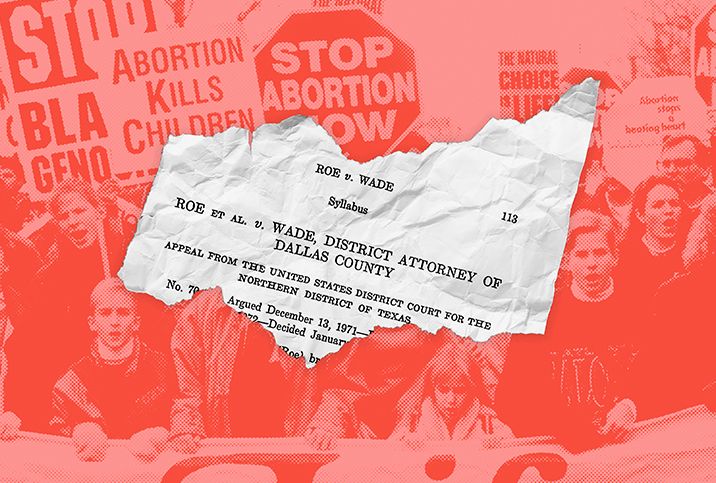Being Denied an Abortion Can Have a Lasting Impact on Mental Health

In addition to religious and ethical qualms, many antiabortion advocates justify their stance by asserting abortion harms pregnant people's mental health, causing them a lifetime of guilt, regret, grief and depression. But research and medical professionals say this isn't often true.
Former Justice Anthony Kennedy summed up the antiabortion sentiment following the 2007 Supreme Court case of Gonzales v. Carhart when he wrote, "While we find no reliable data to measure the phenomenon, it seems unexceptionable to conclude some women come to regret their choice to abort the infant life they once created and sustained. Severe depression and loss of esteem can follow."
However, there is reliable data which demonstrate that in addition to the physical and financial hardships of unwanted pregnancy, being denied an abortion can adversely affect a person's mental health and overall life satisfaction in the short and long term.
With the Supreme Court's recent overturning of Roe v. Wade, a world in which millions of people will have to face unwanted pregnancy with limited access—or no access—to abortion is here.
"We know that people's feelings about pregnancy are complicated and nuanced and often fail to fall into the binaries into which our society tries to categorize them. That said, an unwanted pregnancy or child can cause great physical and emotional stress on the pregnant person and their child," said Jennefer Russo, M.D., an OB-GYN in Los Angeles.
"Some are able to resolve it over time if they choose to continue their pregnancies, and some may opt to terminate to do what is best for themselves and their families. Those who can't access abortion when they make that choice have demonstrated poorer mental health outcomes," Russo added.
"An unplanned pregnancy in and of itself can be stressful, but another major layer of stress is not feeling like there are sufficient options for how to proceed, especially safe options, which can majorly impact one's mental health, including symptoms of depression and anxiety," said Brandy Smith, Ph.D., a psychologist at Thriveworks, a counseling and psychiatry provider with in-person and online services, based in Birmingham, Alabama.
The American Psychological Association (APA) decried the Supreme Court's June 24 decision regarding Roe v. Wade in a statement released that same day.
"This ruling ignores not only precedent but science, and will exacerbate the mental health crisis America is already experiencing," said APA President Frank C. Worrell, Ph.D. "We are alarmed that the justices would nullify Roe despite decades of scientific research demonstrating that people who are denied abortions are more likely to experience higher levels of anxiety, lower life satisfaction and lower self-esteem compared with those who are able to obtain abortions."
The Turnaway Study
The landmark Turnaway Study is the most extensive study to date to demonstrate the impact of having an abortion versus being denied treatment.
The project, conducted by researchers at the University of California, San Francisco, involved nearly 1,000 pregnant people from 21 states. Researchers interviewed participants routinely for 10 years, beginning one week after visiting an abortion clinic.
About two-thirds of participants received an abortion, while one-third were turned away because they were past the gestational limit in their state. In the short term, the people who were denied an abortion experienced more symptoms of stress and anxiety and lower levels of life satisfaction and self-esteem compared with those who received their desired treatment.
"An unwanted pregnancy, like any unwanted event, can make people more vulnerable to depression, anxiety and stress. Pregnancy, unlike just any unwanted event, comes with a specific set of circumstances," said Chloe Haaz Sica, Psy.D., a psychologist in Montgomery County, Pennsylvania.
"If a woman must continue in an unwanted pregnancy or a wanted pregnancy that is not viable due to genetic, medical or financial concerns, then she is stuck. When we, as humans, feel stuck and unsupported, we become vulnerable to depression and anxiety," Haaz Sica said.
More than 50 papers based on the Turnaway Study have been published in peer-reviewed journals since its conclusion in 2016. This includes a report published in 2018 in the American Journal of Psychiatry that indicated no difference in the risk of suicide between people who had received an abortion and those who had been denied. The people who were at the highest risk of suicide were those with a history of mental illness, violence or abuse.
Individuals' reasons for seeking abortions vary, and many people cite multiple motives. But conflict with a partner is among the more prevalent, according to a 1996 study published in the journal Women's Health Issues. More than 20 percent of 51 participants, all of whom visited a University of North Carolina abortion clinic, had been abused in the previous year. Nearly 8 percent had been abused during their pregnancy.
Another paper, published in 2020 in Social Science & Medicine, indicated most people who received an abortion felt relief—not regret. The study also suggested that five years after their procedure, most participants felt they had made the right decision.
"The most common emotion after an abortion is relief," Russo said. "In fact, when we try to do studies on what improves patient experience and satisfaction with abortion, it is very difficult to narrow down factors that make people more satisfied because the vast majority of patients report that they are satisfied or very satisfied after completing a desired abortion.
"As we know from the Turnaway Study, among other peer-reviewed scientific studies on mental health outcomes after abortion, its effect on mental health is typically neutral or positive," she continued. "Of course, if someone has a preexisting mental health condition or if they are feeling prolonged feelings of sadness or anxiety after abortion, they should seek care. Most abortion providers have resources available for counseling or additional support for those who need it after abortion."
After six months, the state of mental health for people who were denied abortions and those who received them was about the same, according to the Turnaway Study. The study authors said these findings suggest people are emotionally resilient and do not suggest abortion harms pregnant people's health.
Mental health impacts of unwanted pregnancy
Body autonomy is important, and forcing someone to undergo pregnancy and birth without consent could amplify existing traumas and bring about new wounds, Smith said.
"Consent is taken into consideration with sexual acts but does not seem to be taken sufficiently into consideration with pregnancy or giving birth," she continued. "We know the importance of having consent when it comes to sex, so maybe having that perspective when it comes to pregnancy and birth can help people understand how the experience can be traumatic."
Pregnancy could also affect a person's ability to continue taking certain medications, including those necessary for managing mental health conditions.
"Pregnancy impacts one's hormones in powerful ways, so to have that experience on top of not being able to take medications that previously helped regulate one's system without willingly making that choice adds another difficult layer to the short- and long-term impacts to consider," Smith said.
'When we, as humans, feel stuck and unsupported, we become vulnerable to depression and anxiety.'
Research indicates that being denied an abortion can affect people's quality of life and health in myriad other ways as well, including increasing financial hardship and exposure to violence. Participants in the Turnaway Study who gave birth were also more likely to report symptoms such as chronic headaches, migraines, joint pain, gestational hypertension and severe complications, including eclampsia and postpartum hemorrhage.
Multiple studies show how physical health and financial status can correlate with mental health, affecting a person's risk of depression, stress, anxiety and insomnia.
Abortion is at least 10 times safer than continuing a pregnancy and having a baby, according to Russo.
"A full-term pregnancy incurs risk to the pregnant person of high blood pressure, diabetes, and many other medical complications which are higher risk for people who already have health problems going into pregnancy," she said.
A disproportionate effect on vulnerable individuals
Poor health outcomes from pregnancy are more likely to affect people of color due, in large part, to racism and misogyny, according to Russo.
"Maternal mortality and the rate of preterm delivery are on the rise in the U.S. in a way that is atypical for a country with a high gross domestic product. Bans on abortion will disproportionately impact the health of people of color, women and trans men who seek abortion care," she said.
The Turnaway Study represents a majority of people who seek abortions, but it does not provide a full picture of how abortion restrictions could affect some of the most vulnerable individuals, including those who were unable to go to a clinic due to lack of autonomy, transportation or financial resources. The study also excluded people with maternal health issues and those who had received a diagnosis of fetal abnormality or demise. Most of the participants who were denied abortion were already in the second trimester, while nine out of 10 abortions are performed during the first trimester.
"People who are able to access the abortion they are seeking have better mental health outcomes than those who are denied abortions," Russo said. "I have taken care of so many patients who were beyond the gestational age where we could perform an abortion. They cried and wondered how they would cope with having another child while caring for the kids they already have, because most people having abortions have other children.
"Just a few days ago, I had a patient burst into tears when I told her I couldn't do her procedure," she continued. "She said, 'I just don't know how I can have this baby. My health is at risk with this pregnancy, and no one seems to recognize that or to be willing to help me.' Thankfully, I was able to transfer her to the higher level of care she needed, but this is not available to many patients. When I think of a post-Roe world, I think of these patients and multiply them exponentially. The misery this change will cause will be enormous. It breaks my heart."
Abortion is a medical procedure that is currently illegal or restricted in some portions of the United States. For more information about the legality of abortion in your area, please consult a local healthcare provider.




















